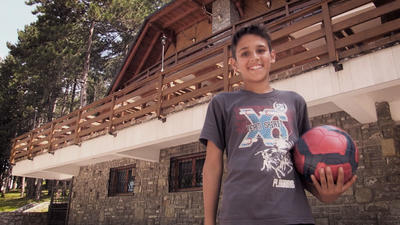“Saving a sinking boat filled to the brim with desperate people who cannot swim involves a lot of risks and is a dangerous operation,” says Wiet Vandormael, Médecins Sans Frontières/Doctors Without Borders (MSF)’s training coordinator.
Tunisian fishermen who had received training from MSF rescued a boat carrying 130 people on 30 August. The people were then brought to Zarzis by the fishermen where they received medical support from the MSF team.
“The bodies of those unfortunate people who died at sea have to be cared for with dignity without endangering the health of communities," continues Wiet.
"Through the exchange of experiences between MSF and the different Libyan and Tunisian people involved, we are increasing the capacity for assisting people in distress and handling the disastrous consequences.
“I was really touched by the motivation of the fishermen and the difficult situations they are facing.”
Boats in distress
For years, Tunisian fishermen have been encountering boats in distress and have saved lives by rescuing people onto their fishing boats.
Most of the people trained by MSF are fishermen who navigate smaller boats with only a small crew, although some also navigate larger 40-metre vessels and go out in the open sea for several days.
In order to increase their capacity to carry out rescues at sea, MSF has conducted a six-day training course with 116 local fishermen in the town of Zarzis.
MSF is also carrying out training for the Tunisian and Libyan Red Crescents, the Tunisian Civil Protection service and the Tunisian National Guard in dead body management and how to receive people who are rescued and brought to shore.
Abdessalem Triki, a fisherman from Zarzis
"Sometimes I've been forced to jump into the water to rescue people, leaving behind my boat. I know this puts me at a big risk but I cannot let someone drown in front of me without doing anything.
"Normally we take them to our boats and we take care of them. Sometimes they are in very bad physical state, we give them food or cook something hot.
"We lose money and work there, but we have to do it."
They are human beings
The training has familiarised the fishermen with all the steps involved in a rescue operation. They have been taught how to communicate with the people onboard as well as how to contact the Maritime Rescue Coordination Centre in Italy to call for additional support.
They have also been provided with, and taught how to use, security and rescue equipment such as protective material, clothing and life vests, as well as how to prevent contact with bodily fluids.
“On one occasion we found a small boat full of people, which was already sinking,” says Yanes Bechiryanes, a mechanic onboard a Zarzis fishing boat.
“We could not leave them in such a situation and called for assistance from two other fishing boats which we work with. We rescued and distributed the people amongst the three boats.
"They were very scared and we had to calm them. We are losing hours of work and therefore money, but they are human beings and we have an obligation to help them.”
Nourdin Achourmtent, a fisherman from Zarzis
“Increasingly we find more and more refugees and dead people at sea.
"About five years ago the first 12 dead bodies were washed up onto the beach and we had to bury them. We have even discovered dead bodies in our fishing nets, we bury the people in the best way we can.
"The problem comes from Libya, now we find ships with more than 700 refugees on board and we cannot rescue everyone. We ask for help and distribute the people between different fishing boats working nearby.
"We can no longer work as we once did, now we have many problems when we go out to sea but we have to face them and help these people.”
Hijacked by people smugglers
The Libyan coast has become a major smuggling hub for people attempting to cross the Mediterranean to reach Europe.
Fishermen encounter more boats that are in much worse conditions than before, and are much more prone to sinking.
With the increased number of smuggling operations in Libya, fishermen have also told MSF that they are reluctant to go close to Libyan waters, as they fear getting their boats attacked and hijacked by people smugglers.
The exact number of people who die crossing the Mediterranean will never be known, but at least 2,498 people are confirmed to have died this year.
Slah Blehbiskis, a diving fisherman from Zarzis
“I am a diver going down to 20 and 50 metres deep. I started finding dead people under the sea a long time ago.
"When a refugee boat sinks the fishermen alert me and I go to help them to recover the dead bodies that are underwater. We take the bodies to the port and we tell the police and firefighters to deal with them.
"Since four or five years ago the situation is getting worse and worse. Everyday there’s more people leaving Libya to cross the sea.”
Safe and legal journey
“Tragedies at sea will continue to regularly occur as people are desperate to flee to Europe,” says Wiet.
“Search and rescue helps save lives but is not a long-term solution. The European Union needs to create safe and legal ways for people to reach Europe so that they don’t have to risk their lives during the journey.”





